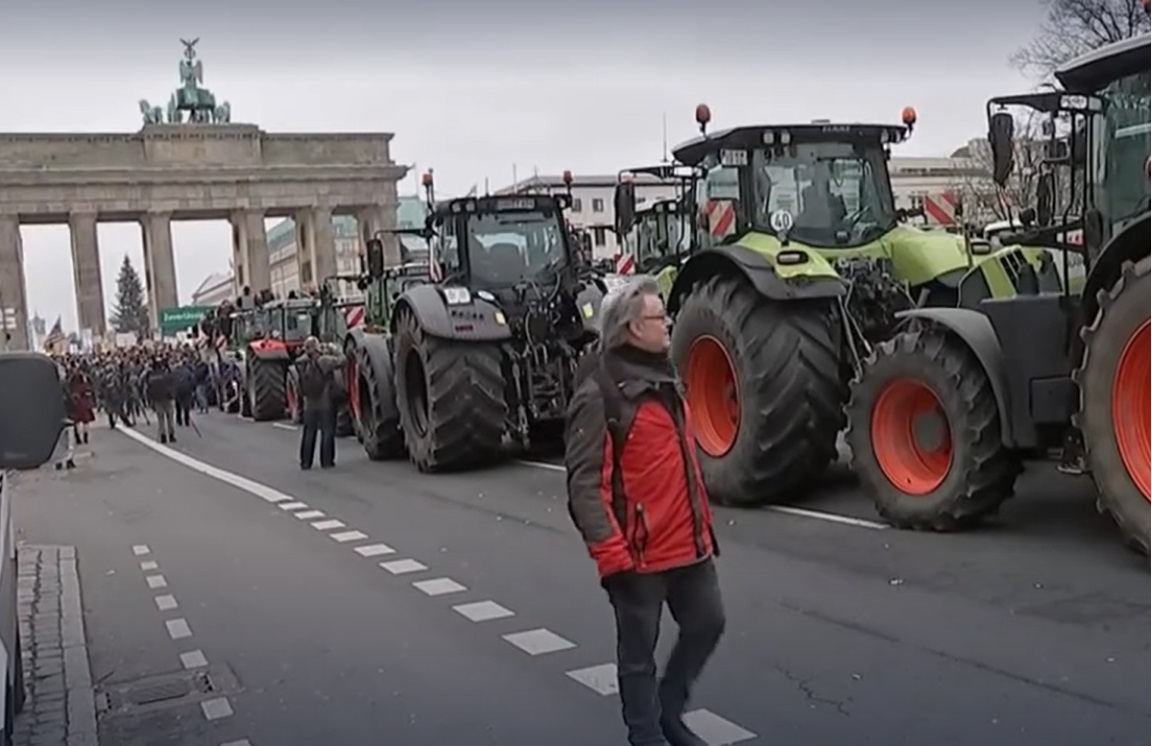Farmers in Germany are planning a week of widespread industrial action from Monday 8 January. The protests are motivated by the German government’s decision to abolish the planned “farmers’” discount on diesel and to apply the road tax to tractors, which were previously exempt from the tax. Farmers in Latvia also receive “shaded” fuel, which is cheaper.
Strike culture in Germany is part of professional everyday life in several sectors. Strikes are organised by trade unions with the aim of achieving better pay rates for their sector. In 2022, strikes were most common in the manufacturing industry, with an average of 47.2 strike days per 1 000 employees (Source: Statistik der Bundesagentur für Arbeit, Ergebnis der Erwerbstätigenrechnung des Bundes), which was by a margin the highest in Germany. According to the statistics, employees of budgetary institutions (including doctors and teachers) were on strike for 6.8 days in 2022.
It should be noted that at European and world level, the Germans are relatively “lazy” strikers – the absolute champions in Europe are France and Belgium. The Hans-Bökler-Stiftung (a foundation close to the German trade union association) has compiled statistics on strike days in different countries around the world between 2011 and 2020, with Belgium topping the table with 97 strike days per year per 1 000 workers, followed by France with 93 days. Germany, with an average of 18 days per year, is in the bottom third of the table. Why do Germans strike so rarely? The reason lies in legislation which states that strike action as a legal weapon for workers is only allowed in situations where the strike is organised by trade unions and is motivated by a fight for better pay.
What is special about the farmers’ protests that started across Germany on 8 January? Based on German law, the farmers’ strike has no legal basis, because these protests are not organised by a trade union and are not motivated by the need for higher wages. The farmers are represented by the German Farmers’ Association, which is more akin to an employers’ association, and the aim of the protest is to put political pressure on the government. Nevertheless, the German Constitutional Court, in an extraordinary session, found the protest to be justified.
Today, talking to some German farmers in my circle of acquaintances, I heard opinions that were mostly very emotional: the government’s decision, which would result in an additional revenue of around 1 billion for the budget, demonstrates the politicians’ disconnection from the people. Farmers have been confronted with the fact that no one had initiated a discussion with them. However, this is generally seen as the ‘last straw’ in many years of difficult relations between farmers and politicians, dominated by complete alienation, misunderstandings and recriminations. Farmers in Germany feel that politics does not defend them. Their interests have been ignored for many years and their disappointment with the current political course is high.
The policy protects consumers and their needs for quality and healthy food. Demand for organic food in Europe as a whole has increased by 153% over the last 10 years (Source: AMI, FiBL, OrganicDataNetwork). At the same time, consolidation among food retailers in Germany is at an unprecedented level: of the €195 billion turnover of food retailers in 2022, more than two-thirds will be accounted for by just four retailers – Edeka Group, Schwarz Group (Lidl, Kaufland), Rewe Group (Rewe, Billa, Toom, Penny, Lekkerland) and Aldi Group (Aldi Nord, Aldi Süd) (Source: Statista.de). Economists refer to this situation in Germany as a ‘polypolis’, which also has a direct impact on purchasing prices, which are low.
Many Latvians travelling to Germany say: “Prices in your shops are lower than in Latvia!” Sometimes this is true, but at the bottom of the food chain it is the growers and producers who suffer. Latvian exporters also tend to suffer, pointing out that purchase prices in Germany are “surprisingly low”.
It is difficult to predict how the farmers’ protests in Germany will end. Even if the government eventually decides to cancel the planned amendments, the resentment is unlikely to go away. Moreover, farmers are a rather “ungrateful” electorate – cheap, expensive (because they receive a lot of money in subsidies), environmentally unfriendly (because they use heavy machinery) and only less than a million – about 2% of the total working age and potential voters (Source: BMEL-Statistik).




Leave a Reply
You must be logged in to post a comment.